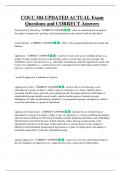COUC 504 UPDATED ACTUAL Exam
Questions and CORRECT Answers
Social Justice Counseling - CORRECT ANSWER - refers to counseling that recognizes
the impact of oppression, privilege, and discrimination on the mental health of individuals
social injustice - CORRECT ANSWER - refers to the unequal distribution of rewards and
burdens.
oppression - CORRECT ANSWER - is pervasive and exists across multiple groups (e.g.,
people of color, people of lower socioeconomic status or social class, gay men, people with
disabilities) and at varying levels (e.g., individual, institutional, cultural). Oppression can be said
to have two modalities (i.e., oppression by force and oppression by deprivation) and be of three
types (i.e., primary, secondary, and tertiary)
*result of oppression is imbalance of power
oppression by force - CORRECT ANSWER - involves the act of imposing, on an
individual or a group, an object, a label, a role, an experience, or a living condition that is
unwanted and that causes physical or psychological pain. Examples directed at individuals or
marginalized groups include sexual assault, negative media images of minority groups,
kidnapping (of either an individual or members of a marginalized group), and physical violence
toward an individual or a group of individuals.
oppression by deprivation - CORRECT ANSWER - includes the act of depriving an
individual or a group of an object, a label, a role, an experience, or a living condition that hinders
physical and psychological well-being. Examples include neglecting individuals and withholding
job promotions from them because of their minority status, denying certain groups a rich
educational experience on the basis of their skin color or socioeconomic sta-tus, making it
difficult to find affordable transportation from home to a place of employment, and making it
practically impossible to find safe, affordable housing
primary oppression - CORRECT ANSWER - consists of overt acts representing either of
the two modalities of oppression (i.e., oppression by force, oppression by deprivation)
,secondary oppression - CORRECT ANSWER - involves individuals benefiting from overt
oppressive acts against others. Although individu-als involved in secondary oppression do not
actively engage in oppressive acts, they do not object to others who do engage in overt
oppressive acts and do benefit from the oppression
tertiary oppression (internalized oppression) - CORRECT ANSWER - refers to the
identification of the dominant message by members of the minority group, often to seek
acceptance by the dominant group. Like secondary oppression, tertiary oppression can be passive
in nature
structure violence (institutional oppression) - CORRECT ANSWER - results when social,
political, economic, and other institutional entities and processes intentionally or unintentionally
erect barriers to development, wellness, dignity, and human potential. Structural violence can be
overt, although it is often covert, making it harder to detect.
ex. providing insufficient funding to inner-city and rural schools, limiting access to healthy and
affordable food, accepting high unemployment rates for certain minority groups, limiting access
to quality health care and preventative care, and making it difficult to find affordable
transportation.
privilege - CORRECT ANSWER - made up of several components, such as having power,
access, or unearned advantage, and holding a majority status
*oppression and privilege are inversely related
empowerment - CORRECT ANSWER - the process by which people, organizations, or
groups who are powerless and mar-ginalized (a) become aware of the power dynamics at work in
their life context, (b) develop the skills and capacity for gaining reasonable control over their
lives, (c) which they exercise, (d) without infringing on the rights of others, and (e) which coin-
cides with actively supporting the empowerment of others in their community.
*goal of social justice counseling involves empowering disenfranchised groups
resilience - CORRECT ANSWER - the set of behaviors and attitudes that clients identify
as beneficial in coping with stressful situations and adversity
, Milestones - CORRECT ANSWER - 1. 1971. Counseling and the Social Revolution. a
special issue of the Personnel and Guidance Journal (currently known as the Journal of
Counseling & Development) is published. The publication encourages counselors to actively
engage in the social change process and address issues related to racism, sexism, destruction of
the environment, and ending warfare.
2. 1987. the American Association for Counseling and Development (currently the American
Counseling Association [ACA]) publishes a position paper on human rights that urges counselors
to advocate for social change through personal, professional, and political activities.
3. 1992: Sue et al. (1992) publish the multicultural counseling competencies and standards.
4. 1998: Social Action: A Mandate for Counselors, edited by Courtland Lee and Garry Walz, is
published.
5. 1999: A special issue of the Journal of Counseling & Development, a publication edited by
Tracy L. Robinson and Earl J. Ginter, is dedicated to racism.
6. 2003: ACA endorses the Advocacy Competencies developed by Lewis, Arnold, House, and
Toporek (2003).
7. 2005: The revised ACA Code of Ethics places an increased emphasis on multiculturalism and
social justice issues in counseling. In particular, the new standard E.5.c. directs counselors to
"recognize historical and social prejudices in the misdiagnosis and pathol-ogizing of certain
individuals and groups and the role of mental health professionals in perpetuating these
prejudices through diagnosis and treatment."
8. 2007: The Association for Counselor Education and Supervision (ACES) adopts the theme
"Vanguards for Change: ACES and Social Justice" and sponsors a Social Justice Summit as part
of the conference. The second Social Justice Summit takes place in 2009.
9. 2010-2011: The profession sees an increase in publications related to social justice i
Mental Health: Culture, Race, and Ethnicity—A Supplement to Mental Health (USDHHS, 2001)
- CORRECT ANSWER - US Surgeon's General report. helped illustrate potential
consequences of social injustice and predictors of mental illness for various racial/ethnic
minority groups and move the field of multicultural counseling forward. it expanded counselors'
and other mental health professionals' thinking of what culturally competent (and culturally
incompetent) practice focuses on. More specifi-cally, the report's findings served as an impetus
for conceptualizing multicultural counseling competence as more than just cultural sensitivity
and tolerance of difference.




